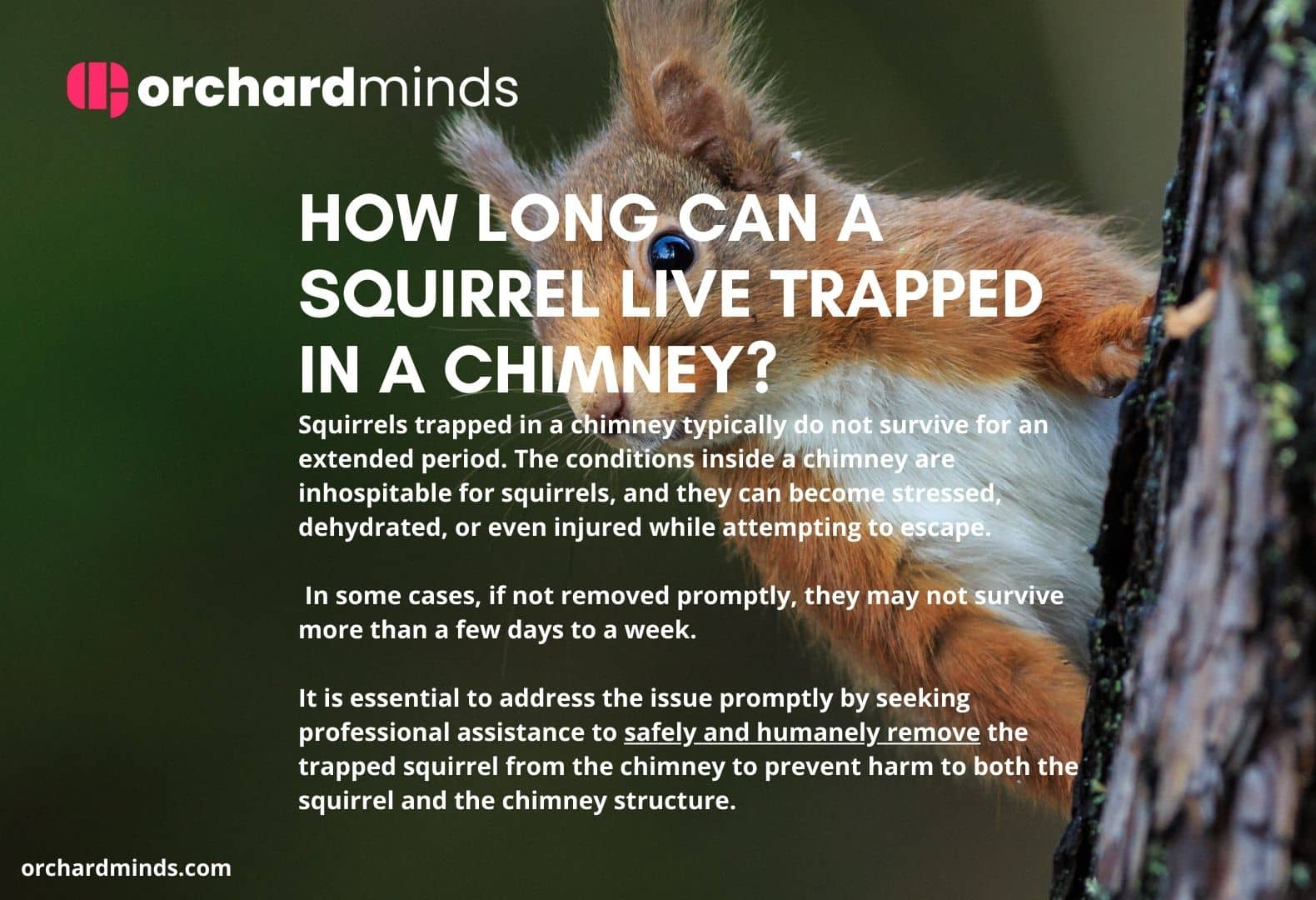A squirrel does not last long in a chimney because the conditions are not ideal for it. The squirrel becomes stressed, dehydrates, or even gets hurt in a desperate attempt to escape. If not removed in time, some of these can be last no more than a few days or even up to a week.
This needs to be done on an emergency basis, seeking professional service to ensure the safe and humane removal of the squirrel from the chimney, with least harm to the squirrel or the chimney structure.
How to tell if a squirrel is trapped in a chimney
Listen for the characteristic scratching and scurrying sounds that often come from a squirrel stuck in the chimney; dropping or nest material near your fireplace may also be an indication. If you should hear any of these signs and suspect that a squirrel has got into your chimney, which you remember, go not to confront the critter yourself but instead call on safe assessment and humane facilitation in getting the squirrel removed.
The Challenges of a Chimney for a Squirrel
Squirrels are not familiar to chimneys, a forest is not their native habitat, and several challenges that are meaningful to these creatures are:
Lack of Food and Water: A trapped squirrel will be deprived of its normal sources of food and water. It will become wholly weak and dehydrated at once due to lack of sustenance.
Increased Stress: Squirrels are innately flighty and high-strung animals. To be confined in a small, unfamiliar area is a surefire cause of tremendous amounts of stress that could negatively impact their health and survival.
No Exit: Likely a greater concern for a squirrel that has gone down a chimney would be its lack of an exit. Chimneys are a one-way route, and squirrels can easily get lost in these. Often, this just leaves them frantically trying to find their way out, which can be dangerous to the squirrel.
Environmental Hazards: Temperature and general air inside a chimney can get really harsh and unforgiving. The air begins getting heady, laden with soot and other noxious gases, which must be very uncomfortable for a squirrel.
How to Remove Squirrel Stuck in Your Chimney?
1. Make a lot of noise
Making a lot of noise in most cases is not one of the best ways to get a squirrel out of the chimney. Although noise would scare the squirrel and have it moving, more likely than not, it would do nothing but stress the animal out and drive it further in, thereby making everything hard. It is much better and, most importantly, safer to get in touch with an expert in the field of wildlife removal or chimney sweep for the humane and efficient removal of the squirrel.
2. Make use of a Rope
Getting a squirrel off your chimney by use of a rope would never be recommended at all. This can be dangerous to you or harmful to the squirrel, in ways which involve either hurting the animal or the chimney. Getting a hold of a professional wildlife removal expert or a chimney sweep with experience in dealing with animal invasions is a surefire way to get the job of clearing a squirrel from a chimney done.
They will be equipped with the appropriate tools and knowledge to deal with the situation.
3. Use Squirrel Repell
The use of repellents to free a squirrel trapped in your fireplace is usually ineffective. Repellents are used to deter animals that are found in a particular area, not to get them out of an enclosed area like a chimney. It is best to have a professional wildlife removal expert or a certified chimney sweep provide on-site assessment in order to use the correct techniques where removal of the animal can be safely carried out.
4. Employ a Live Trap
One way that was highly recommended to get a squirrel out of your chimney is to live trap it. A live trap holds the squirrel unharmed and can release it into the outdoors. Just be sure that it is placed correctly, and you will also want to follow any local ordinances and licensing regarding humanely trapping and relocating.
5. Hire Animal Control Services
Hiring animal control services is often the best course of action when dealing with a squirrel trapped in your chimney. Professional wildlife removal experts or animal control services have the experience, equipment, and knowledge to safely and humanely handle the situation, ensuring the squirrel’s well-being and preventing harm to your property or the animal.
How long will it take for a squirrel to die after trapping it in a chimney?
The factors that could determine how long a squirrel dies inside a chimney may include the health status, resources, and the general environmental conditions surrounding a squirrel. Squirrels are tough and resourceful, and indeed, trapped-in-the-chimney ones must be really tough and stressful.
Under such conditions, the squirrels hardly survive for more extended periods, and therefore it takes even days or even a week before they can give in to the challenges faced inside, such as a lack of food and water and then exposure to adverse environmental conditions. It is, however, pertinent to note that addressing a trapped squirrel should be prompt and humane—if not, it results in suffering and, above all, safe removal.
Can squirrels get into the attic through the chimney end?
Definitely, squirrels get inside the attic room via the chimney if it has openings and crevices that allow access. Squirrels easily make a chimney an entry point since they are able to climb and are supple. Squirrels can absolutely gain access from the roof and into the attic in the first place, provided that openings or cracks exist in the chimney structure, such as a damaged or missing chimney cap. To prevent them, put a chimney cap or screen so that squirrels cannot gain access, though the chimney is supposed to be well ventilated. Regular chimney maintenance and inspections can help identify and address any potential entry points for wildlife.
Do Squirrels Make Nests in Chimneys?
Yes, squirrels nest in chimneys. Chimneys can actually provide a covered area with relatively easy access for squirrels to build their nest—especially in the winter, when squirrels are naturally trying to find a warm, safe place to nest. They do so by entering through damaged or uncapped flues, in some cases. Once inside, they can construct their nests by using leaves, twigs, and other materials. This is not healthy, as the nests clog airflow and sometimes even result in fires. So, in order to avoid having your chimney infested with squirrels, you need to have a chimney cap or screen that will block their way in, while at the same time allowing free circulation of air in and out of it. It is, therefore, important one does regular check and maintenance of a chimney to avoid the menace of wildlife.
What Are the Dangers of Having Squirrels in Your Chimney?
Having squirrels in your chimney can pose several dangers and concerns:
- Fire Hazard: Squirrels may build nests with materials like twigs, leaves, and paper inside the chimney. These nests can be highly flammable, and if a fire is lit in the fireplace, it can lead to a chimney fire, endangering your home.
- Blocked Airflow: Squirrel nests can obstruct the chimney’s airflow and ventilation, affecting the efficiency and safety of your heating appliance or fireplace.
- Health Risks: Squirrel droppings and urine can carry diseases and parasites that may pose health risks to humans. If the squirrels die in the chimney, their decomposing bodies can also create unpleasant odors and potential health hazards.
- Structural Damage: Squirrels may damage the chimney flue or components while attempting to enter or exit, potentially requiring costly repairs.
- Noise and Disruption: The presence of squirrels in the chimney can lead to disruptive sounds, especially during their active periods, which may disturb the peace and quiet of your home.
- Further Entry: Squirrels can use the chimney as an entry point to your attic or other parts of your home, potentially causing additional problems, such as nesting in the attic and damaging insulation or wiring.
To mitigate these dangers, it’s advisable to prevent squirrel entry into the chimney by installing a chimney cap or screen. If you suspect squirrels in your chimney, seek professional wildlife removal services to safely and humanely remove them, address any damage, and prevent further intrusions.




Leave a Comment